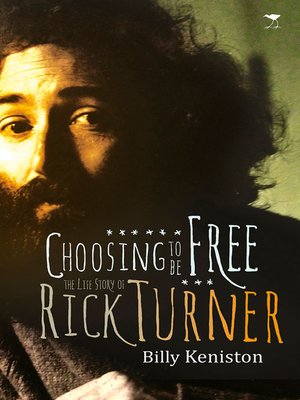
Sign up to save your library
With an OverDrive account, you can save your favorite libraries for at-a-glance information about availability. Find out more about OverDrive accounts.
Find this title in Libby, the library reading app by OverDrive.



Search for a digital library with this title
Title found at these libraries:
| Library Name | Distance |
|---|---|
| Loading... |
'Human beings can choose. They can stand back and look at alternatives. Theoretically, they can choose about anything. They can choose whether to live or to die; they can choose celibacy or promiscuity, voluntary poverty or the pursuit of wealth, ice-cream or jelly.' – Rick Turner Born in Cape Town on 25 September 1941, Rick Turner was one of South Africa's most original and powerful thinkers and is remembered today as an activist and a remarkable lecturer pioneering the teaching of radical political philosophy. For almost ten years, from 1968, when he returned to South Africa from his studies at the Sorbonne, to 1978, when he was shot by an unknown assassin, Turner played an important role in the opposition to apartheid, especially by provoking whites to expand their vision of what South Africa could be. Turner's friendship with Steve Biko and others in the Durban-based black consciousness movement enabled him also to act as an effective interpreter of black thinking to politically conscious whites. Believing in the 'necessity of utopian thinking', he wrote a short book, The Eye of the Needle (1972) that sought to envision a very different kind of society. It has become a classic of its kind. For the authorities Rick Turner was a constant source of annoyance, a threat and anomaly that had to be dealt with. What was most dangerous about him was that his life and thought failed to fit within the dominant narrative of his time. Never a member of the ANC or the Communist Party or any political party for that matter, he propounded a vision for the transformation of South Africa that was both independent and radical. Shot through a window in his Durban home on 8 January 1978 at the age of 36, Rick Turner lived a short life. The window in which he was able to make an impact on his society was very narrow. Nonetheless, for those who came into contact with them, his ideas had a profound effect on their imaginations about what was possible. Following four months after Biko's death in detention, Turner's murder created a public outcry. Since his death, his legacy has yet to take proper shape. In the severely compromised political climate following the end of apartheid, there is little room for the idealist vision that Rick Turner lived and died for.







